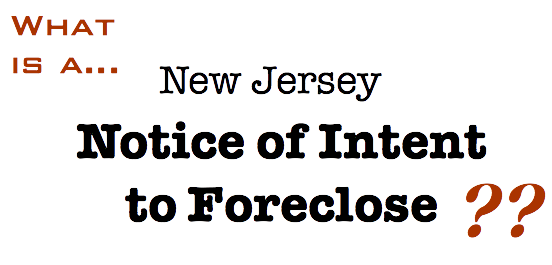Foreclosure is a frightening event for struggling homeowners. Should homeowners fail to make their regular mortgage payments, the mortgage lender is able to begin the foreclosure process on the property. However, because New Jersey is a judicial foreclosure state, mortgage lenders must go through state courts for any repossessions. The rules and procedures for this process are listed under The New Jersey Fair Foreclosure Act. The most important of which is the New Jersey Notice of Intent to Foreclose. 
The start of the foreclosure process
Homeowners are considered in default when they fail to make their mortgage payment. New Jersey's foreclosure process begins once the homeowner defaults on such payments. While many mortgage lenders will begin the foreclosure process only after three or more successive missed payments, they are able to initiate proceedings after the first missed payment.
Regardless, the New Jersey Fair Foreclosure Act requires lenders to adhere to specific requirements before they are able to file a legal foreclosure complaint against the defaulting homeowner.
Notice of Intent to Foreclose
Before mortgage lenders can file a complaint in foreclosure, they must send the homeowner, through either registered or certified mail, a Notice of Intent to Foreclose. This mailed document must include a requested return receipt and must be sent a minimum of 30 days before the lender can file a foreclosure Complaint.
This notice is an extremely important protection afforded by the New Jersey Fair Foreclosure Act. It signifies that the recipient has missed mortgage payments, but also, and this is very important, it gives homeowners 30 days to cure the default. The Notice of Intent to Foreclose must also include the following additional information:
- An explanation of the lender's relation and interest in the property. This includes the lender's name and address, their representative if applicable, and proof of mortgage ownership.
- An explanation for why the lender is attempting to foreclose. ie the homeowner has neglected their mortgage payments
- Information about how the homeowner can cure the default. Through this 'right to cure', homeowners can have their mortgage reinstated if they are able to pay the full amount owed within the allotted time period. The lender must accept the payment if made and cannot charge court costs or attorney fees during this time.
- A statement of how much must be paid to cure the default, and by when. While the New Jersey Fair Foreclosure Act requires a minimum of 30 days, mortgage lenders can dictate a longer time allotment.
- An explanation of the lender's intentions should the homeowner be unable to cure the default.
- A statement that the foreclosure process can also be stopped following the filing of a foreclosure complaint.
- A statement regarding your rights to sell or transfer the property's title at any point during the foreclosure process.
- A statement advising you to contact an attorney for professional legal advice. This part must include contact information for Legal Services and county lawyer referral service.
- A thorough list of every available resource that can help you cure the default. This part must include contact information for the New Jersey Department of Banking and Insurance.
For more information about the Notice of Intent to Foreclosure, or about the next steps in the New Jersey foreclosure process, contact us at Amerihope Alliance Legal Services. We are a leading law firm with result-oriented lawyers who have over 5,000 successful cases of loan restructuring and stopping foreclosures.
Foreclosure is a devastating process for the whole family, which is why it is our mission to offer clients the options necessary to relieve their mortgage problems. We are determined to resolve financial challenges in a compassionate and dedicated manner.










